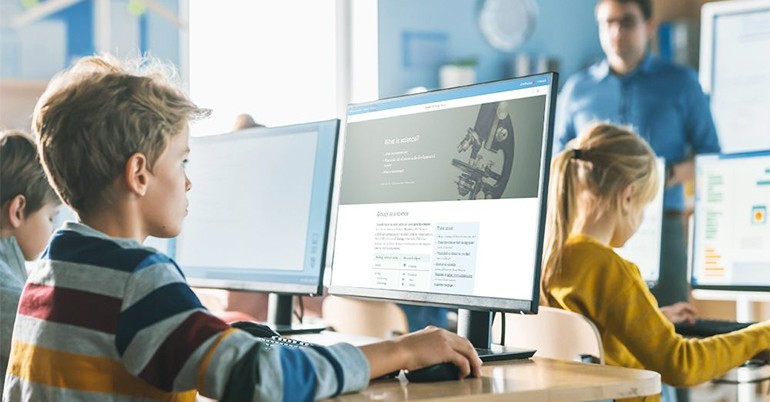Digital learning has become an integral part of learning
With Opiq, the pupil’s head is full of wisdom, but the backpack is light!
Learning has become increasingly flexible over the last decade thanks to technological development. Cloud-based digital learning platforms such as Coursera, Udacity or Udemy are spreading worldwide. These platforms offer a wide range of online courses on various subjects. Flexibility in when and where to learn has never been greater.
The transition to digital learning materials is only a matter of time for general education schools. Estonia is generally at the forefront of digital learning. The digital learning platform Opiq was launched back in 2014 and quickly became popular due to the COVID-19 pandemic. During the pandemic, the Ministry of Education and Research purchased licenses for all pupils and teachers to use the Opiq environment. This gave a boost to distance learning. All that was needed was a smart device and an internet connection. Opiq is a great way for pupils to keep up with their studies, even if they go abroad with their families or are absent from school due to illness.
Once life returned to normal and schools reopened, teachers and pupils continued to use Opiq. The necessity of Opiq is confirmed by a research carried out this year by researchers at the University of Tartu, who discovered that 38% of the teachers surveyed use Opiq every day and 31% a few times a week. (Reference: https://drive.google.com/file/d/1MtOkcpESPDaysTgFKIgyixV_9EdY_A6E/view) The use of a digital learning environment allows flexibility. The pupils at the newly opened Mustamäe Riigigümnaasium use paper textbooks in the classroom, but Opiq on a smartphone, tablet or laptop at home.
Digital learning has added value that is relevant for today’s learners. For example, the chapters of the digital learning materials are divided into shorter, more manageable bites, which we call sections. This helps pupils to extract information in portions. The content of the digital learning material is interactive and playful. Videos, audio files, explanatory graphics and visuals are embedded in the text. Knowledge can be tested with a variety of multiple-choice tests to help pupils master the material.
Teachers can monitor pupils’ progress and target personalised work or even courses to those who need it. Opiq’s learning material uses artificial intelligence to search the entire library for material related to a particular section. This helps to avoid learning gaps – pupils can quickly and conveniently explore topics previously covered in the material. A particularly eager pupil will be able to search for further information, for example in the material of future classes.
It is important for the Opiq team to provide the best opportunities for pupils. Opiq Estonia now has over 500 digital textbooks created by experts in their field. The materials are aligned with the national curriculum.
As every country has its own curriculum, it is important to collaborate with the local publishers whose material is used in local schools. Opiq is currently operating in Estonia, Finland, Lithuania, Kenya, Uganda and Kazakhstan.
Check out the materials corresponding to the Estonian curriculum here. Each digital textbook has at least one free chapter to give you an idea of the content of the textbook.
There is also a range of free study materials available on the platform, which can be accessed without creating an Opiq account and without logging in. To access free of charge materials, select ‘Tasuta’ from the package filter under the Opiq Library.
Check out Opiq here: https://www.opiq.ee/Catalog
Shortcut to Opiq Library: https://www.opiq.ee/Search/Kits







